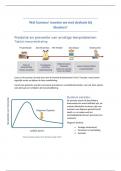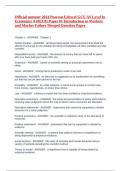1900 – Biological African student number rises to 10, 618 (South African History Online,
2017).
1901 – Die “Vriendenkrin” is established to assist families’ affected by the Anglo-Boer War
(South African History Online, 2017).
1902 - The Christian National Education Policy
Christian National Education schools were set up after the Anglo-Boer War. Afrikaans
groups resisted the schooling system that had been establish by the British, known as state
schools, so they opened up their own unconventional schooling founded on the principles of
Christian National Policy (Christie, 1991:173). The CNE Policy was later passed when the
National Party came into Power. The CNE truly believed that all children of different races
were to be treated differently and they each held different values based on their ethnicity,
specifically, gender and race. Due to the influence of the Apartheid, mission schools were
set up to integrate the concept of “separation” into their curriculum to reinforce social class
and social order (Fiske & Ladd, 2004). This new education ordinance was first approved in
the Transvaal where free and compulsory education for students who were of European
decent was offered in South Africa. Financial aid was given to these mission schools
throughout the country and a special curriculum was drawn up for black schools (Christie,
1991:49). As we can see, educational policies are not simply manifested by the government;
there is a large influence from opposing cultural groups, much like the CNE policy (Christie,
1991:57). I consider this an important moment in South African history as this is the
beginning of separate education systems fuelling the Apartheid regime, which later leads to
the development of The National Education Policy of 1967 and the implementation of the
Bantu Education System in 1953 (Christie, 1991:175).
(254 words)
1903 – The Ordinance 7 Act for Transvaal region and the Ordinance 27 Act is passed
(Orange River Colony) (South African History Online, 2017).
1904 – J.E Anderson appointed director of education in the Transvaal (Booyse, et al, 2011.
Pg 170). Separate primary courses for black South Africans are in contemplated in the
Transvaal (South African History Online, 2017).
1907 – Smuts Act (separate primary courses) on education is implemented in Transvaal
(Booyse, et al., 2011:172).
1910’s
1910 - The union government was set up (Christie, 1991:50). Secondary education is now
free for white children in Transvaal.
, 1911 – All primary school curriculums are reviewed and language outlines are drafted in the
Transvaal (Booyse, et al., 2011:173).
1912 – The Minister of Education, F.S. Malan, announced that the university system in Cape
Town should satisfy both white communities – both Afrikaans and English (South African
History Online, 2017).
1913 – Implementation of the Land Act establishing “reserves”, later called “Bantustans” and
“homelands” (South African History Online, 2017).
1914 – The Laurence Commission investigates multi-racial universities in South Africa
(South African History Online, 2017). Afrikaans as the medium of instruction rather than
Dutch. The Beginning of Civil War in South Africa and the beginning of World War I
(Booyse, et al., 2011:174).
1915 – Schools providing secondary education are under the control of the Union
Department of Education (Booyse, et al., 2011:174).
1916 – Individual and uniform curriculum initiated in Transvaal (Booyse, et al., 2011:174).
1918 – Separation of school systems for coloured children occurs in the Cape (Booyse, et
al., 2011:175).
1920’s
1920 – The Civil Labour Policy and Apprenticeship Act further disadvantages African (South
African History Online, 2017). The privilege of free education is extended to black children
too (Booyse, et al., 2011:175).
1922 - New laws were passed in concern for funding for African Education (Christie,
1991:50). Africans have to fund themselves if state subsidies are not enough, which causes
continual issues under funding (South African History Online, 2017). Beginning of economic
depression (Booyse, et al., 2011:176).
1923 – The Native (Urban) Act was passed (South African History Online, 2017).
1924 – The National Union of South Africa (NUSAS) forms. They represent and promote the
interests of students attending South African universities (South African History Online,
2017).
1925 – The Communist Party of South Africa begins night school in a church building in
Johannesburg (South African History Online, 2017). The first secondary school to open for
coloured learners (Booyse, et al., 2011:176).




